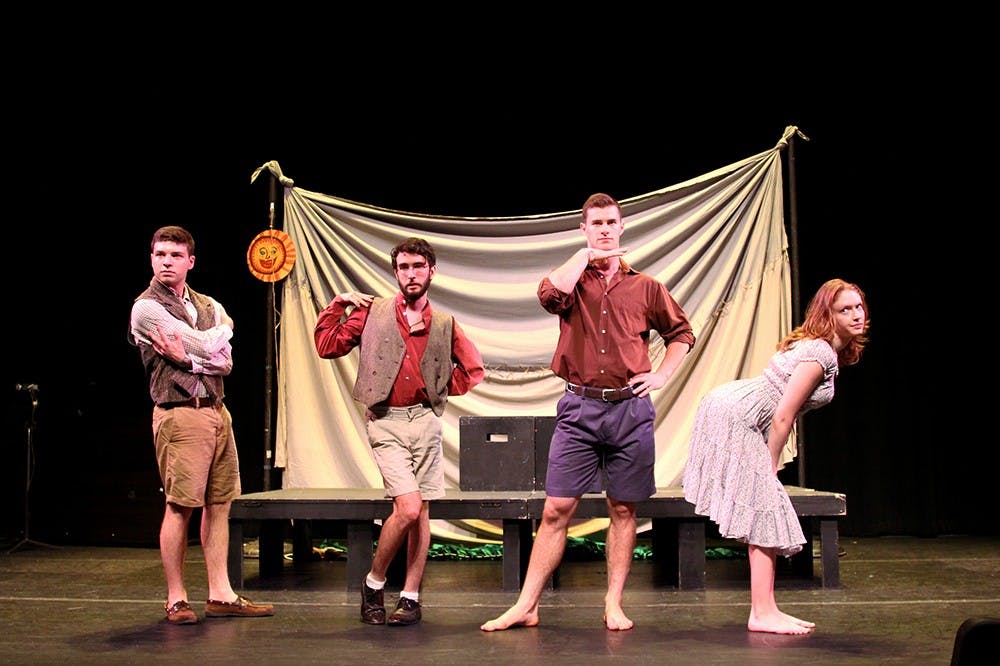A musical that reimagines romantic tropes as age-old as Pyramus and Thisbe with the music of the 1960s and runs almost uninterruptedly for over 50 years is, quite literally, timeless. In this sense, Princeton University Players’ Reunions show “The Fantasticks” could not be more fitting for the occasion.
“It’s the longest-running show in the world,” director and PUP president Cameron Platt ’16 explained. “It’s kind of an institution — a tried-and-true classic that people know well and one that’s been done the same way for a very long time.”
Platt, however, chose not to do things in the same way. “I have a lot of affection for the original production, but I’ve always thought there’s so much possibility in the text for it to really come alive in new ways.” The original puts a spin on the star-crossed lovers narrative: instead of being actual enemies, two fathers stage a family feud in order to orchestrate a romance between their children, Matt and Luisa. PUP’s production has put yet another spin on this variation through changes in the characters’ genders as well as backstories.
The main change comes in the role of El Gallo, who alternates between a narrator and a character who partakes in the action. While El Gallo is traditionally played by a man, Platt cast Sarah Cuneo ’15 in the role. “The original show only had one female role, and I wanted to give more opportunities to female actors,” Platt said.
While the change in El Gallo’s gender does not necessarily alter the plot, when combined with Platt’s hope to explore the character further, the casting decision led to a series of changes that shaped the entire show. According to Platt, in the Off-Broadway production, it is never made clear why El Gallo actively intervenes in the young lovers’ lives. “I wanted to find a way to give El Gallo a deeper emotional stake in what happens,” she said.
To explore this, Platt and Cuneo, along with Maeli Goren ’15, who plays Luisa, turned to another enigmatic character in the original production: Luisa’s mother, who does not appear in the show. However, Luisa does have a necklace of her mother's that El Gallo takes from her for no apparent reason. Keeping in mind the possibilities made available by having a female El Gallo, Platt and Cuneo decided to pose El Gallo as Luisa’s absent mother.
This reinterpretation of El Gallo’s identity not only changes her relationship with Luisa, but also the nature of the character. “In the original text, it’s very easy to read El Gallo as vaguely sinister because he’s an omniscient presence who’s pulling these strings,” Cuneo said. “Putting me in the mother role … it doesn’t feel sinister anymore. I’m interfering in these characters’ lives because I care about them.”

What began as a means of giving El Gallo motivation as a character, which Platt did not originally intend on making explicit to the audience, soon filtered into all aspects of the production. “It became so important to all our scene work, our choreography, everything, that we choreographed the opening number in such a way that the story point becomes very clear from the start and becomes the concept for the show,” Platt said.
Like in the opening sequence, the tailoring of the physical elements to the characters and plot pervades the rest of the production. Tying the physicality to the storyline is especially important, Cuneo explained, because the reinterpretation of El Gallo often only comes alive through the characters’ bodies instead of their lines. Thus, according to choreographer Ryan Gedrich ’16, the characters’ movements, both in dance and otherwise, were all created in collaboration with the actors. “This is something that’s actually been generated by and feels very genuine to the actors … so it feels like one thing that is very solid and whole,” he said.
However, the entire process — including reimagining the characters and staging the choreography — had to be condensed into the very tight schedule of Dean’s Date and final exams. Fortunately, the minimalist staging of the show eased the workload. “ ‘The Fantasticks’ is pretty much meant to be done with a platform and a curtain, and the score is written for a piano and a harp,” Cuneo said. “It’s a very difficult piece for an actor, but it’s a very logistically doable piece.”

Logistics aside, “The Fantasticks,” particularly in this new interpretation, also caters to the Reunions audience on many other levels. Platt pointed out that, despite the show’s status as a classic, it is surprisingly little known among current students. By comparison, older alumni may be much more familiar.
“I also think that’s what makes it so exciting as a Reunions show — over the years, it’s become kind of a cliché,” Gedrich said. “People think ‘The Fantasticks’ and they think it’s a very simple, nostalgic show about people falling in and out of love, when in reality, the basis of the material is so nuanced and intelligent.” The reinterpretation, he hopes, will bring out complexities that even those who know the show may not anticipate.
Lastly, the theme of the story itself is, as Platt said, “very Reunions.” This is partially due to the musical’s status as a classic, but also because it is, at its core, a show about memory.
“Especially in our reimagining, the whole thing is rooted in parents and children, making memories,” Platt said. “Which — well, isn’t that what Reunions is all about? Making memories?”








